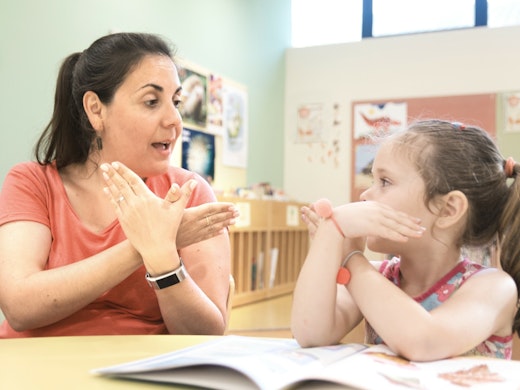Education

Explore a wealth of information related to education for people with disability. Learn about inclusive classrooms, specialised programs and resources to ensure that everyone has access to high-quality education.
Schooling options
In certain educational settings, students with disability can seamlessly join curriculum classes; however, specialised support is provided in some institutions. For many children with disability, school can be a challenging time. However, there are a number of ways to make this easier and ensure they feel supported by parents, teachers and peers as they develop lifelong skills.
Government-funded school support programs:
These schools are equipped with qualified staff and unique facilities that offer tailored assistance. Support programs enable children to attend mainstream schools while receiving additional support, covering aspects such as tests, exams, schoolyard interactions, transportation and beyond.
Independent schools:
Independent schools are non-government institutions that may support students with disability without government funding. To find an independent school near you, please visit the Independent Schools Australia website and refer to the state and territory directory for more information. All recognised government and non-government schools in Australia operate within the bounds of state and territory and Australian Government legislation. Please contact the school you are interested in to discuss what support options might be available.
Specialist schools:
Specialist schools can offer specific avenues of support for students with intellectual disability, physical disability, auditory and visual disability, in addition to children with an autism spectrum or developmental disorder. The curriculum at these schools is based on the Australian curriculum but can be tailored to suit individual student needs. Class sizes may also be smaller. Please visit the Australian Schools Directory to search for local schools that may be able to accommodate your needs or those of a student in your care.
![Lady helping girl on laptop [Source: Shutterstock]](https://agedcareguide-assets.imgix.net/news/articles/wp/shutterstock_1950311173.jpg?fm=pjpg)
Flexible schooling:
Students with disability may thrive in flexible school options to suit their academic, social and behavioural needs. This can include part-time schooling, homeschooling and long-distance or virtual education.
Part-time schooling:
A part-time education schedule may be available to students who can still attend school but can’t attend for the same amount of time that other students can.
This could be because school becomes overwhelming for them after a certain amount of time each day, because of a health condition that impacts their energy levels or because they have appointments with therapists and specialists that need to occur during school time.
Homeschooling:
At-home classes can provide students with a safe, supportive and flexible environment that meets their academic or behavioural needs.
Homeschooling requirements in each state and territory can be found here:
- Australian Capital Territory
- New South Wales
- Northern Territory
- Queensland
- South Australia
- Tasmania
- Victoria
- Western Australia
Online schooling:
At-home classes are generally delivered through the internet, with learning resources sent to students through online portals. Teachers may interact with students via video conferencing platforms, emails or phone calls.
More information about the availability and provision of distance education, across each state and territory, is available through the following hyperlinks:
Building life skills
![Boy in wheelchair watering a tree [Source: Shutterstock]](https://agedcareguide-assets.imgix.net/news/articles/wp/shutterstock_2236727047.jpg?fm=pjpg)
The National Disability Insurance Scheme (NDIS) was designed to support the day-to-day well-being of participants with disability. Institutions, tutors, or support services that provide students with the opportunity to learn may be subject to certain requirements or responsibilities to facilitate a student’s education, outside of NDIS funding.
However, the NDIS is intended to help participants develop broader life skills and facilitate formal education where applicable. Funding may be allocated to help people live freely and contribute to society through a range of supports, such as assistance with public transportation, maintaining personal hygiene, and vocational training.
For further guidance on developing life skills, including social skills, individuals can explore resources such as "Five Ways to Develop Your Social Skills " and "Tips for Promoting Independence in Adults with Disability ".
Accessible transport:
Access to transport is critical for people with disability in enabling them to participate in work, study, leisure and social activities. For people with limited auditory and visual capabilities, public transport can present some challenges.
![Lady in wheelchair using public transport [Source: Shutterstock]](https://agedcareguide-assets.imgix.net/news/articles/wp/shutterstock_1534895582.jpg?fm=pjpg)
Grocery shopping:
Grocery shopping is an essential part of daily life, yet people with disability may encounter unique challenges when learning to purchase goods. Creating an inclusive shopping experience involves addressing physical accessibility and sensory considerations, along with providing support mechanisms to ensure that everyone, regardless of ability, can navigate and fulfil their individual needs.
Budgeting:
It is important for people with disability to have financial independence and strong budgeting skills. Thankfully, NDIS plans recognise this and provide support to help people with developing these skills. By understanding and managing their financial resources, people can make informed decisions and gain greater financial autonomy, even in the face of challenges. Learning to take financial control and achieve independence is a critical life skill.
Transitioning out of school:
It is important to inform your family and support network when you wish to transition out of school and into employment or further study. It can take a lot of planning and coordination to make sure you get the best support available to reach your goal.
![Man carrying laundry basket [Source: Shutterstock]](https://agedcareguide-assets.imgix.net/news/articles/wp/shutterstock_2230534615.jpg?fm=pjpg)
NDIS programs and available funding
The NDIS is only able to provide funding for people when their needs extend further than what a school, employer or traineeship provider is required to provide. However, it is important to contact your support coordinator and determine whether you are eligible for NDIS funding, which may cover supports and services, such as those listed below.
Assistive technology, such as mobility or communication aids
Having and using assistive technology whilst at school can help students with disability to stay engaged in classroom settings. Tools, devices, programs and furniture can make a difference to students and help them to learn more from educators. There is a large range of equipment and technology available to support children, adolescents, young adults and adults — from kindergarten through to tertiary education.
There are various low-cost forms of assistive technology available in retail stores that can help students manage their anxieties or stress. These include pencil grips, document holders and even fidget toys. Additionally, there are software solutions that allow text-to-speech, which can help students comprehend and engage with educators. Adaptive keyboards and speaker systems are also available, among other technologies that can provide assistance. All of these options are only a small part of what technology can offer to students. Specific furniture could include adjustable desks and accessible ramps in the schoolyard, along with inclusive playground equipment to accommodate the needs of those with disability.
![Teacher helping students using tablets [Source: Shutterstock]](https://agedcareguide-assets.imgix.net/news/articles/wp/shutterstock_634019507.jpg?fm=pjpg)
Providers of assistive equipment
You can find providers who offer assistive equipment or technology by searching the Disability Support Guide database of NDIS providers across Australia.
Click here to search for a provider in your area.
Providers of assistive equipment
A behaviour management/support plan outlines strategies for a person with disability to develop positive behaviours. The development of behaviour management plans can help when social or communication difficulties go beyond school or work-based support.
Behaviour support plans have strict rules around restrictive practices and must only be used as a last resort. An official behaviour support plan can only be developed by a qualified professional registered with the NDIS.
Employment support
The NDIS is intended to support the employment of people with disability, as developing work experience may benefit participants. Employment may lead to financial independence, improved health and well-being — building social networks and finding a sense of purpose for participants that will serve their career trajectory well.
In 2021, Employ My Ability, the Australian Disability Employment Strategy was released, linking it to Australia’s Disability Strategy 2021 – 2031. The strategy has four priority areas: lifting employer engagement, capability and demand; building skills, experience and confidence of young people with disability; improving systems and services for job seekers and employers and changing community attitudes.
![Girl packing shelves [Source: Shutterstock]](https://agedcareguide-assets.imgix.net/news/articles/wp/shutterstock_2214584409.jpg?fm=pjpg)
School leaver employment supports
NDIS funding is available for participants leaving school who would like to transition into finding a job. SLES offer individualised support for up to two years after finishing Year 12 to help build skills and confidence when transitioning from school to work.
SLES funding can be added to your NDIS plan during your initial planning conversation or a scheduled/requested review with your planner or local area coordinator.
Disability employment services
If you have a permanent disability you may want to access disability employment services. DES are not funded under the NDIS but by the Department of Social Services.
DES can help you find and maintain work in a mainstream environment, known as ‘open employment’.
There are two types of programs within DES:
- employment support services for job seekers with permanent disability and an assessed need for regular, ongoing support in the workplace;
- disability management services for job seekers with disability, injury or health conditions who are not expected to need long-term support in the workplace but may need irregular flexible support to keep a job.
You can visit the Job Access website to obtain more information.
Providers of employment help
You can find providers who can provide assistance in obtaining employment by searching our database of NDIS providers across Australia.
Click here to search for a provider in your area.
Transport
Funding for the specific transport needs of people with disability is included in the NDIS but exactly what the funding covers and how to use it can be confusing.
A participant can access funding through the NDIS for transport assistance if the participant can’t use public transport.
There are three transport support levels:
Level 1 - The NDIS will provide up to $1,606 per year for participants who are not working, studying or attending day programs but are seeking to enhance their community access.
Level 2 - The NDIS will provide up to $2,472 per year for participants who are currently working or studying part-time — up to 15 hours a week, participating in day programs and for other social, recreational or leisure activities.
Level 3 - The NDIS will provide up to $3,456 per year for participants who are currently working, looking for work or studying at least 15 hours a week and are unable to use public transport because of their disability.
![Boy in wheelchair on school bus [Source: Shutterstock]](https://agedcareguide-assets.imgix.net/news/articles/wp/shutterstock_92902894.jpg?fm=pjpg)
Providers of transport services
Search the Disability Support Guide database of NDIS providers across Australia to find providers to assist with transport services and support.
Click here to search for a provider in your area.
Who can help
If you’re seeking further clarity, help or guidance to determine your eligibility for education or work-based NDIS-funded support, your my NDIS Contact or support coordinator may be able to set you on the right path.
It is important to maintain contact with those who know the system, as it is evolving and changing through newly announced and introduced policies. Prior arrangements, such as student transport, may be subject to change soon and speaking with industry experts can help you to stay on top of future changes.
















